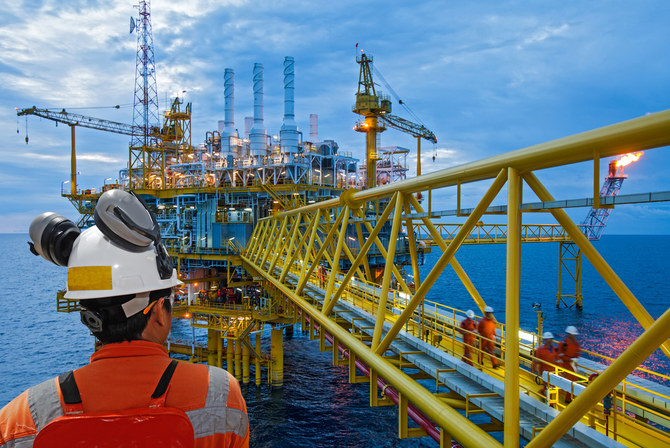RIYADH: Saudi Arabia is focused on achieving high-quality growth through sustainable non-oil activities, aiming to boost private sector dynamism and productivity, while ensuring continued economic progress that goes beyond short-term expenditures, a minister stated.
Speaking during a panel discussion at the Budget Forum 2025 in Riyadh, Minister of Economy and Planning Faisal Al-Ibrahim highlighted that Saudi Arabia's growth rate has consistently ranged from 4 percent to 6 percent in recent years and is expected to continue at a similar pace in the years ahead.
“We aspire for more than just numbers. We also aim for high-quality growth — growth that is based on sustainable non-oil activities, not dependent on temporary expenditures that stop when the spending stops,” Al-Ibrahim said.
He further added: “The growth we expect for non-oil activities by the end of this year is approximately 3.9 percent, and for next year, it is projected to be 4.8 percent. These figures will be adjusted as estimates improve.”
Saudi Finance Minister Mohammed Al-Jadaan also emphasized that Vision 2030 is focused on establishing stable, sustainable public finances by reducing reliance on volatile revenue sources like oil.
“This is to guarantee the sustainability of funding for sectors that require a long-term horizon to achieve stability,” he said.
Al-Jadaan continued: “The difference between then and now is that spending is now sustainable and continuous because we have diversified the economy, diversified income sources, and utilized major fiscal policies.”
Al-Ibrahim stressed the importance of economic diversification in Saudi Arabia, pointing to tourism as a key example. He explained that without the deliberate focus on expanding the tourism sector and related industries, the country’s economic performance today would be significantly weaker.
“The growth we’re seeing in other sectors would not have compensated for the global changes affecting traditional sectors we used to rely on, such as the voluntary oil production cuts,” Al-Ibrahim said.
He added: “The role of tourism in the economy’s composition today is a testament to the strength and value of economic diversification.”
The minister also discussed the prioritization of economic transformation, with diversification at the top of the agenda.
“However, we’ve highlighted two key sectors: tourism and industry, along with their sub-sectors. Tourism helps us achieve rapid diversification and creates swift job opportunities. It also establishes a soft infrastructure for long-term investments, ideas, visitors, and industries,” Al-Ibrahim explained.
Al-Ibrahim emphasized that Saudi Arabia views the defense sector as a strategic priority and will continue investing in it for both national security and economic reasons.
“We have spent on defense and will continue to invest in it for several reasons, and its returns are strategic. Local content in the sector was at 4 percent, and today it has reached approximately 13 percent to 20 percent, with a target of 50 percent by 2030,” the minister said.
This focus on local content will prioritize complexity, as “many countries are now reinvesting in military sectors to meet strategic needs,” and the Kingdom is part of this global trend, focusing on peaceful objectives and long-term economic returns.
Al-Jadaan further explained that sustainable economic growth in Saudi Arabia heavily relies on maintaining stable and responsible public finances. To achieve consistent economic growth, the government must manage its financial resources effectively and direct them toward sectors that drive economic development and diversification, such as non-oil industries.
“Enabling public finance to support economic diversification is crucial. If public finance fails to allocate resources to the targeted sectors, or if it lacks commitment and consistency, the efforts may falter,” Al-Jadaan said.
He continued: “Fiscal policies consist of two components: government spending and the tax burden on the economy. These two policies are used to control and support the economy.”
Al-Jadaan acknowledged the importance of the structural reforms introduced at the start of Vision 2030, recognizing the challenges involved.
“Some of these reforms were considered painful,” he said, referring to difficult decisions such as reducing subsidies, introducing taxes like the value-added tax and excise tax, and imposing specific fees.
“These measures could have caused significant shocks in other economies, but the Saudi economy managed to overcome them,” he noted.
Al-Jadaan clarified that these reforms were not about imposing taxes and fees for their own sake, but about ensuring public finances could sustainably support the economy.
Reflecting on Saudi Arabia’s economic history, Al-Jadaan acknowledged that during the decades when oil dominated the economy, the country experienced rapid growth.
“The past 40-50 years were not wasted; we built a very strong infrastructure. However, this growth was not sustainable,” he said.
He explained that in the past, spending would rise and projects would be launched during periods of high oil revenue, but spending would stop, and projects would face delays when revenues fell.
Al-Jadaan also highlighted the evolution of Saudi Arabia’s fiscal policies. “We did not previously use debt instruments as we do today. Now, we use them to balance revenues and ensure continuous and sustainable expenditures. This allows for proper planning—not just for government entities and targeted sectors, but also for the private sector,” he said.
The shift toward sustainable spending has had significant benefits, Al-Jadaan emphasized, including improved services for citizens across various sectors such as health, education, and transportation.
“Sustainable spending supports a sustainable economy, which translates into better services for our citizens,” he said.





















